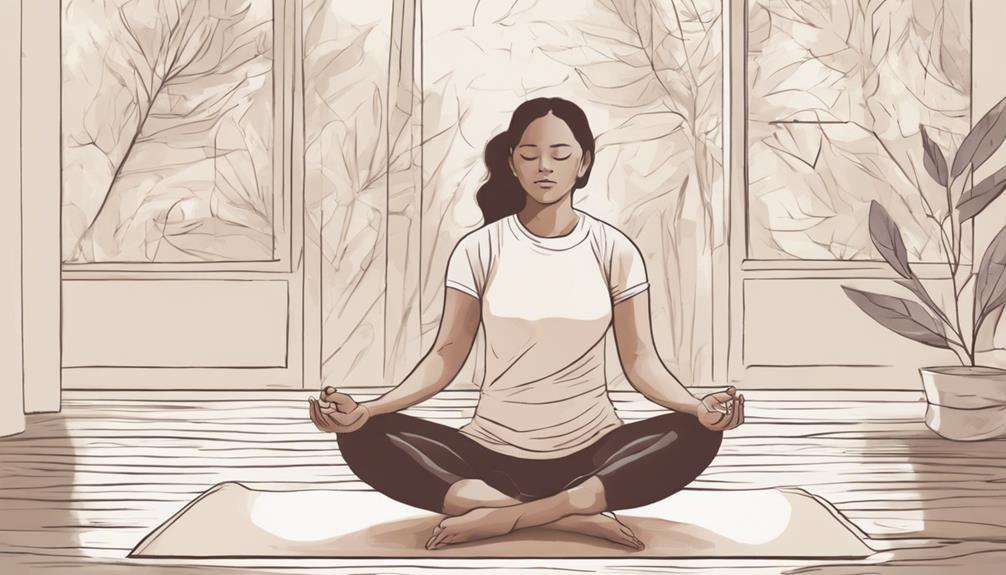Imagine a serene landscape where your mind is as tranquil as a still pond, your body free from tension. Could this mental oasis hold the key to improving your blood pressure?
As you explore the connection between mindfulness, relaxation practices, and cardiovascular health, you may uncover a path to better well-being that goes beyond traditional interventions.
Discover how simple techniques can empower you to take control of your blood pressure and nurture a healthier lifestyle.
Key Takeaways
- Yoga and deep breathing techniques effectively lower blood pressure levels.
- Mindful meditation like Yoga Nidra induces relaxation, reducing stress and improving blood pressure.
- Integrating yoga and mindfulness practices promotes cardiovascular health and inner peace.
- Cultivating a calm mind through yoga enhances blood pressure management and overall well-being.
The Benefits of Yoga for BP
Yoga significantly reduces blood pressure by promoting relaxation, reducing stress, and enhancing cardiovascular health. This all-encompassing mind-body practice offers a range of benefits for individuals looking to manage their blood pressure effectively.
Regular yoga sessions have been found to be particularly helpful in lowering both systolic and diastolic blood pressure levels in individuals with hypertension. By incorporating physical postures, breathing techniques, and meditation, yoga creates a thorough approach to blood pressure regulation.
The calming and stress-reducing effects of yoga play a significant role in supporting overall heart health and blood pressure management. Studies have shown that yoga interventions have a positive impact on decreasing blood pressure and improving heart health outcomes.
Yoga Poses for Lowering BP
To enhance the effectiveness of your blood pressure management regimen, incorporating specific yoga poses designed to promote relaxation and reduce stress can be highly beneficial.
Certain yoga poses, such as Savasana (Corpse Pose) and Sukhasana (Easy Pose), have been shown to help lower blood pressure by inducing a state of deep relaxation. The practice of yoga is linked to reduced sympathetic nervous system activity, which can lead to lower blood pressure levels over time.
Poses emphasizing deep breathing, like Anulom Vilom (Alternate Nostril Breathing), aid in regulating blood pressure and enhancing overall cardiovascular health. Additionally, poses such as Balasana (Child's Pose) and Uttanasana (Standing Forward Bend) help calm both the mind and body, contributing to decreased blood pressure readings.
Consistent practice of yoga, including poses like Viparita Karani (Legs-Up-the-Wall Pose), supports improved blood circulation and assists in maintaining healthy blood pressure levels. Incorporating these yoga poses into your routine can be a valuable addition to your blood pressure management strategy, promoting relaxation and overall well-being.
Deep Breathing Techniques in Yoga

When practicing deep breathing techniques in yoga, you engage in deliberate, slow breathing patterns that can induce a relaxation response in your body.
These techniques, also known as pranayama, help activate the body's relaxation response, prompting reductions in heart rate and blood pressure.
Benefits of Pranayama
Practicing deep breathing techniques in yoga, such as Pranayama, can greatly contribute to reducing stress levels and lowering blood pressure. Research indicates that regular pranayama practice is beneficial for cardiovascular health, as it activates the parasympathetic nervous system, leading to a decrease in heart rate and blood pressure.
Specific techniques like Anulom Vilom and Bhramari have been associated with improved blood circulation and oxygenation in the body. By incorporating pranayama into your daily routine, you can enhance mindfulness, reduce anxiety, and support overall well-being.
These deep breathing exercises offer a natural and effective way to promote relaxation, manage stress, and positively impact your cardiovascular system. Start experiencing the benefits of pranayama today for a healthier mind and body.
Relaxation Response Trigger
Inducing a state of calmness and reducing stress, deep breathing techniques in yoga can trigger the relaxation response. These practices involve deliberate, slow inhalation and exhalation to activate the body's relaxation mechanisms and help lower blood pressure.
Consistent engagement in deep breathing exercises can lead to the widening of blood vessels, which in turn promotes better cardiovascular health and reduces inflammation in the body. By harnessing the relaxation response through deep breathing, individuals may effectively manage stress-related conditions and improve their overall well-being.
Incorporating deep breathing techniques into your daily routine can play a significant role in enhancing blood pressure control and fostering a state of relaxation that benefits both your mind and body.
Yoga Nidra for Relaxation
Yoga Nidra, a deep relaxation practice involving guided meditation and body awareness techniques, induces a state of profound relaxation often likened to 'yogic sleep'.
During a Yoga Nidra session, participants lie down comfortably and follow verbal instructions that systematically relax different parts of the body. This practice is known for its ability to reduce stress, anxiety, and improve sleep quality, contributing to overall well-being.
Research indicates that regular Yoga Nidra practice can lead to lower blood pressure, enhanced mental clarity, and emotional balance. Remarkably, just 20-30 minutes of Yoga Nidra can offer relaxation benefits similar to several hours of conventional sleep.
Yoga for Stress Reduction

Mind-body practices like yoga play a significant role in reducing stress levels, a key factor in managing blood pressure effectively. Yoga has been proven effective in stress reduction, which is essential for overall cardiovascular health.
Studies have indicated that regular yoga practice can enhance heart rate variability, a marker of the body's ability to respond to stress. By reducing sympathetic nervous system activity, yoga helps maintain a healthy balance in the autonomic nervous system, contributing to better blood pressure control.
Through a combination of breathing exercises, meditation, and physical postures, yoga promotes relaxation and aids in stress relief. This holistic approach to stress reduction can lead to improvements in perceived stress levels and overall cardiovascular function.
The practice of yoga not only benefits physical health but also mental well-being, reducing anxiety and enhancing quality of life, all of which are vital for managing blood pressure effectively.
Mindful Meditation in Yoga Practice
In mindful meditation during yoga practice, you focus on your breath, enhancing your body awareness and fostering a calm mind through movement.
This practice encourages a deep connection between your physical movements and mental state, promoting relaxation and stress reduction.
Focus on Breath
By focusing on your breath during mindful meditation in yoga practice, you can cultivate awareness and inner peace. Mindful breathing techniques help regulate the autonomic nervous system, promoting relaxation and reducing stress levels.
This focused attention on the breath enhances oxygen intake, calming the mind and improving overall well-being. Additionally, incorporating breath awareness in yoga practice has been shown to lower blood pressure by inducing a relaxation response and reducing stress levels in the body.
The practice of mindful breathing not only supports cardiovascular health but also improves circulation, oxygenation, and mental clarity. Through this intentional focus on the breath, you can harness its power to positively impact your physical and mental health.
Body Awareness Connection
Enhancing your yoga practice with body awareness connection through mindful meditation can greatly improve your overall well-being and cardiovascular health. Mindful meditation in yoga practice involves focusing on body sensations, breath, and movements to cultivate awareness and presence.
This body awareness connection in yoga enhances mindfulness, leading to reduced stress levels and improved cardiovascular health. By practicing mindful meditation during yoga sessions, individuals can regulate emotions and manage stress, potentially lowering blood pressure.
Studies have shown that yoga sessions incorporating mindful meditation techniques increase relaxation responses and promote overall well-being. The integration of body awareness in yoga practice supports individuals in developing a deeper mind-body connection, which can contribute to better blood pressure control.
Calm Mind Through Movement
Focusing on mindful movement in yoga practice cultivates a calm mind through the integration of breath, body sensations, and movements, promoting awareness and presence. This integration of mindfulness and yoga has been shown to have significant benefits for lowering blood pressure.
By combining yoga postures with mindfulness techniques, individuals can enhance their mind-body connection, leading to reduced stress levels and increased relaxation. Engaging in mindful meditation during yoga encourages you to be fully present in the moment, improving mental clarity and emotional well-being.
The practice of yoga and mindfulness together can contribute to improved cardiovascular health and overall well-being. Embracing this holistic approach may help you manage your blood pressure and promote a sense of inner peace.
Incorporating Yoga Into Daily Routine
Incorporate yoga into your daily routine for at least 20-30 minutes to improve blood pressure management and overall well-being. Yoga, a practice that combines physical postures, breathing techniques, and meditation, is known to promote relaxation and enhance cardiovascular health. Studies have shown that regular yoga practice can effectively reduce stress, lower blood pressure, and calm both the mind and body.
Specific yoga poses, such as forward bends, gentle inversions, and restorative poses, are particularly beneficial for lowering blood pressure and inducing a state of relaxation. By integrating mindfulness and breathing exercises, yoga can help regulate the autonomic nervous system, leading to sustained reductions in blood pressure levels over time.
Frequently Asked Questions
Can Mindfulness Help With Blood Pressure?
Mindfulness benefits your health by reducing stress and improving blood pressure. Engaging in mindfulness practices can lead to better heart health and overall well-being. Prioritize your health with mindful activities to enhance your cardiovascular health.
What Are Relaxation Techniques for Blood Pressure?
When managing blood pressure, try deep breathing, progressive relaxation, and guided imagery. They assist in calming your body and reducing stress. Incorporating these techniques into your routine can have a significant impact on your overall well-being.
Is Mindfulness Based Stress Reduction Effective for People With Hypertension?
When managing hypertension, consider the benefits of mindfulness. Mindfulness practices, like MBSR, can aid in stress reduction and contribute to hypertension management. Embrace these stress reduction techniques to potentially improve your blood pressure and overall well-being.
Is Regular Practice of Relaxation Techniques Including Meditation Known to Decrease High Blood Pressure?
Regular practice of relaxation techniques, including meditation, is known to decrease high blood pressure. Mindfulness benefits, meditation, and hypertension are interconnected. The impact of relaxation techniques on blood pressure is supported by research and can help maintain healthier levels.
Conclusion
As you journey through the land of mindfulness and relaxation practices like yoga, you're setting foot on a path towards lower blood pressure and improved well-being.
Just as a gentle breeze can calm the stormy seas, these practices can bring tranquility to your body and mind.
Embrace the power of mindfulness and relaxation to sail smoothly through the waters of life, with a steady and healthy heart guiding your way.






